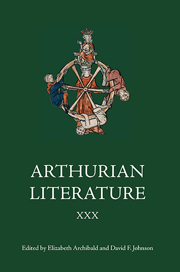Book contents
- Frontmatter
- Contents
- General Editors' Foreword
- List of Contributors
- I Magic and the Supernatural in Early Welsh Arthurian Narrative: Culhwch ac Olwen and Breuddwyd Rhonabwy
- II How Green was the Green Knight? Forest Ecology at Hautdesert
- III Edward III's Arthurian Enthusiasms Revisited: Perceforest in the Context of Philippa of Hainault and the Round Table Feast of 1344
- IV Pagan Gods and the Coming of Christianity in Perceforest
- V Malory's Sources for the Tale of the Sankgreal: Some Overlooked Evidence from the Irish Lorgaireacht an tSoidigh Naomhtha
- VI ‘Transmuer de rime en prose’: The Transformation of Chrétien de Troyes's Joie de la Cour episode in the Burgundian Prose Erec (1450–60)
- VII La Rétro-écriture ou l'écriture de la nostalgie dans le roman arthurien tardif: Ysaïe le Triste, Le Conte du Papegau et Mélyador de Froissart
- VIII Remembering Brutus: Aaron Thompson's British History of 1718
- Contents of Previous Volumes
I - Magic and the Supernatural in Early Welsh Arthurian Narrative: Culhwch ac Olwen and Breuddwyd Rhonabwy
Published online by Cambridge University Press: 05 March 2014
- Frontmatter
- Contents
- General Editors' Foreword
- List of Contributors
- I Magic and the Supernatural in Early Welsh Arthurian Narrative: Culhwch ac Olwen and Breuddwyd Rhonabwy
- II How Green was the Green Knight? Forest Ecology at Hautdesert
- III Edward III's Arthurian Enthusiasms Revisited: Perceforest in the Context of Philippa of Hainault and the Round Table Feast of 1344
- IV Pagan Gods and the Coming of Christianity in Perceforest
- V Malory's Sources for the Tale of the Sankgreal: Some Overlooked Evidence from the Irish Lorgaireacht an tSoidigh Naomhtha
- VI ‘Transmuer de rime en prose’: The Transformation of Chrétien de Troyes's Joie de la Cour episode in the Burgundian Prose Erec (1450–60)
- VII La Rétro-écriture ou l'écriture de la nostalgie dans le roman arthurien tardif: Ysaïe le Triste, Le Conte du Papegau et Mélyador de Froissart
- VIII Remembering Brutus: Aaron Thompson's British History of 1718
- Contents of Previous Volumes
Summary
The term ‘Celtic magic’ has had a long currency in medieval studies, particularly Arthurian studies. being positioned alongside ‘Celtic myth’ as a convenient explanation for elements in vernacular medieval romance whose provenance is not otherwise obvious. Yet both terms. ‘Celtic’ and ‘magic’, are problematic when it comes to definitions, and this is particularly so in relation to two of the most important survivals of Welsh Arthurian literature. Culhwch ac Olwen (Culhwch and Olwen) and Breuddwyd Rhonabwy (The Dream of Rhonabwy). Both tales locate Arthur in the centre of a magic landscape; one that is subject to supernatural events. The figure of Arthur himself is presented quite differently in both texts, and in many ways The Dream of Rhonabwy foreshadows the loss of magic. in the sense of personal charisma and superhuman ability. that accompanies Arthur's appropriation into the French and English traditions. Moreover. particular kinds of literary magic in medieval texts can be related to certain types of narrative discourse. In its most familiar sense. ‘magic’ is associated with narrative agency. that is. with persons or objects who dispense and control the application of magic. whether these are fairy women or kings, or specific objects such as magic rings or potions. This agentive magic. typical of medieval romance. is produced through a discourse of realism which comes close to the modern mode of magic realism. Early Welsh and Irish tales, however, use a different kind of narrative mode; one that foregrounds naturalism rather than realism in its storytelling techniques. This produces a different kind of ‘magic’, an agentless occurrence of wonders that can best be described as the supernatural marvellous. The early Welsh prose tales therefore exemplify a particular narrative strategy which might be called ‘magic naturalism’.
- Type
- Chapter
- Information
- Arthurian Literature XXX , pp. 1 - 26Publisher: Boydell & BrewerPrint publication year: 2013



